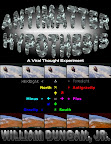Traffic congestion is caused by real estate congestion – the limited prospects of buying a home. Disorganized traffic patterns are caused by disorganized real estate patterns. The current real estate market is stifled by tradition. Affordability is not the primary reason that dictates where people live – availability is. For ride sharing to succeed, as the major contributor to congestion relief it has the potential to become, people who commute to the same vicinity need to become neighbors. Neighbor ride sharing appeals to a wider clientèle than mass transit alternatives because of its unrestricted coverage. The majority hates paying taxes to benefit a minority. Incentives empower those who help themselves. Reimbursement benefits, due to their distributed nature, are open to any resident within or any commuter into the jurisdiction.
To visualize the extent of this problem requires only wall space, investment in a street map and box of push pins, and the motivation to make a difference. Disorder becomes obvious when push pins are stuck into the map at the residence addresses of commuters who work within the same vicinity. As a visual reminder, street maps and push pins can counteract out-of-sight out-of-mind apathy. The goal of this lifestyle changing exercise is to rally the push pins into clusters to promote and advance ride sharing. To facilitate and reward residence moves, toward this end, relocation expenses that improve neighbor ride sharing need reimbursement. Some people are more altruistic than others, and might be willing and able to participate at lower reimbursement levels. To achieve target levels, reimbursement levels should be adjustable to induce customer demand as necessary. To achieve the greatest gain for the least cost, competition between commuters is needed.
To avoid a bureaucratic nightmare of processing claims, disbursements will be made available to commuters through escrow. Disbursements, paid via Electronic Fund Transfers, can only be sought and redeemed, one per commuter, during escrow on owner occupied property transactions. It is the responsibility of escrow companies to certify a ride sharing gain, with criminal penalties for fraud. The names and addresses of all partners within ride sharing distance, which varies with commute distance, must be recorded. The buyer must supply proof. Disbursements of different denominations can be offered to balance commuter demand and available funds. A database will manage these disbursements. Closeness and numbers determine ride sharing gains. The number of eligible disbursements, on qualified separate transactions, for an individual commuter is not limited.
Taxpayers cannot afford full reimbursement. The instantaneous gratification of total compensation is prohibitively expensive. A calculator program is needed to show people the time until break even on ride sharing cost savings from fuel, car maintenance, and car insurance, etc. based on distances, the number ride sharing, and travel time.
To promote a local market for housing clusters, disbursements can be use to defray costs to form real estate holding companies of shareholder occupied properties. With the proper legal foundation, moving should become cheaper and easier – with less red tape. As with Stock Markets, a dynamic, high volume, real estate market should create competition for an expanded range of services including discount brokers. This could also be leveraged to mitigate the current mortgage crisis.
Mortgage Crisis Solution
13 years ago









No comments:
Post a Comment